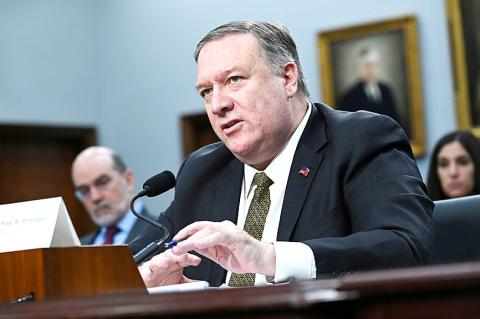US Secretary of State Mike Pompeo on Wednesday emphasized the importance of US legislation that encourages reciprocal high-level visits by US and Taiwanese officials.
Fielding questions during a hearing of a US House of Representatives Appropriations Committee subcommittee in Washington, Pompeo called the Taiwan Travel Act a “very important piece of legislation.”
“You have seen our administration do a great deal to implement that. I’m sure there is more to follow, but I don’t want to get too far ahead of what we are doing,” he said when asked by US Representative Steve Chabot to comment on the act’s implementation.

Photo: Reuters
Chabot, who has long called for Pompeo to invite President Tsai Ing-wen (蔡英文) to speak to the US Congress, said that thanks to the act, US Ambassador-at-Large for International Religious Freedom Sam Brownback concluded a trip to Taiwan two weeks ago.
“Can we, and the people of Taiwan, count on you to advocate for further implementation of the Taiwan Travel Act?” Chabot asked Pompeo.
Pompeo said that he perfectly understands the importance of US-Taiwan relations.
“You have seen what we’ve done with respect to Taiwan. Just a few days ago we sailed through the [Taiwan] Strait,” he said, referring to the passage on Sunday of the US Navy destroyer USS Curtis Wilbur and the US Coast Guard cutter Bertholf, the third such transit this year.
“More importantly, we have taken a much fuller view than previous administrations — this is not partisan, this goes back to Republicans and Democrats alike — of the concerns about the risk that China presents to American wealth creation and our continued democracy,” Pompeo added.
Separately, US Indo-Pacific Commander Admiral Philip Davidson said in a statement before the House Armed Services Committee that the US has “a deep and abiding interest in peace and stability in the Taiwan Strait, and welcomes steps by both sides to reduce tension and improve cross-strait relations.”
However, Chinese President Xi Jinping’s (習近平) “solution of a ‘one country, two systems’ approach to reunification does not reflect the wishes of both sides,” Davidson said.
Although Tsai and her Democratic Progressive Party have committed to “avoid confrontation and prevent surprises” with China, the cross-strait situation is of increasing concern, given the “harsh rhetoric from Beijing toward the leadership in Taipei,” Davidson said.
Concerned with China’s military buildup across the Strait, the US is focused on improving joint interoperability within Taiwan’s military, improving Taiwan’s readiness and supporting Taiwan’s military in accordance with the Taiwan Relations Act, Davidson said.
It is rare for the command to express a view on China’s “one country, two systems” framework, and Davidson’s statement has been officially recorded by the US House.
The US’ posture on cross-strait relations is based on the Taiwan Relations Act, Davidson said, adding that the US maintains a substantive and robust unofficial relationship with Taiwan, opposes any unilateral change to the “status quo” and supports a peaceful resolution of cross-strait issues.

The brilliant blue waters, thick foliage and bucolic atmosphere on this seemingly idyllic archipelago deep in the Pacific Ocean belie the key role it now plays in a titanic geopolitical struggle. Palau is again on the front line as China, and the US and its allies prepare their forces in an intensifying contest for control over the Asia-Pacific region. The democratic nation of just 17,000 people hosts US-controlled airstrips and soon-to-be-completed radar installations that the US military describes as “critical” to monitoring vast swathes of water and airspace. It is also a key piece of the second island chain, a string of

A magnitude 5.9 earthquake that struck about 33km off the coast of Hualien City was the "main shock" in a series of quakes in the area, with aftershocks expected over the next three days, the Central Weather Administration (CWA) said yesterday. Prior to the magnitude 5.9 quake shaking most of Taiwan at 6:53pm yesterday, six other earthquakes stronger than a magnitude of 4, starting with a magnitude 5.5 quake at 6:09pm, occurred in the area. CWA Seismological Center Director Wu Chien-fu (吳健富) confirmed that the quakes were all part of the same series and that the magnitude 5.5 temblor was

The Central Weather Administration has issued a heat alert for southeastern Taiwan, warning of temperatures as high as 36°C today, while alerting some coastal areas of strong winds later in the day. Kaohsiung’s Neimen District (內門) and Pingtung County’s Neipu Township (內埔) are under an orange heat alert, which warns of temperatures as high as 36°C for three consecutive days, the CWA said, citing southwest winds. The heat would also extend to Tainan’s Nansi (楠西) and Yujing (玉井) districts, as well as Pingtung’s Gaoshu (高樹), Yanpu (鹽埔) and Majia (瑪家) townships, it said, forecasting highs of up to 36°C in those areas

IN FULL SWING: Recall drives against lawmakers in Hualien, Taoyuan and Hsinchu have reached the second-stage threshold, the campaigners said Campaigners in a recall petition against Chinese Nationalist Party (KMT) Legislator Yen Kuan-heng (顏寬恒) in Taichung yesterday said their signature target is within sight, and that they need a big push to collect about 500 more signatures from locals to reach the second-stage threshold. Recall campaigns against KMT lawmakers Johnny Chiang (江啟臣), Yang Chiung-ying (楊瓊瓔) and Lo Ting-wei (羅廷瑋) are also close to the 10 percent threshold, and campaigners are mounting a final push this week. They need about 800 signatures against Chiang and about 2,000 against Yang. Campaigners seeking to recall Lo said they had reached the threshold figure over the